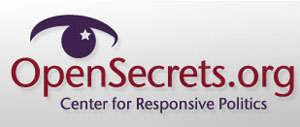Resource:
OpenSecrets.org

OpenSecrets.org is the nation’s premier website tracking the influence of money on U.S. politics, and how that money affects policy and citizens’ lives.
The Center for Responsive Politics launched the website following the 1996 elections. Before that time, the Center, founded in 1983 by U.S. Sens. Frank Church (D-Idaho) and Hugh Scott (R-Pa.), published its work tracking money in politics and its effect on elections and public policy in extensive reports and books. The first Open Secrets book, published in 1990, was a massive 1,300 pages and analyzed contributions by political action committees in the 1988 congressional elections. Featuring contributor profiles for every member of Congress, it was an unprecedented resource that illuminated money’s role in congressional elections and policymaking. Open Secrets also profiled the spending patterns of interest groups and major industries, and included an extensive “Big Picture” section on the patterns of PAC spending and the flow of PAC dollars to each congressional committee. The second edition of Open Secrets, published in 1992, added an analysis of large individual donations — a mammoth task that had never before been attempted.
The OpenSecrets.org website not only allowed the Center to expand its reach beyond those willing to invest in its voluminous and expensive publication, but also greatly accelerated the timing and depth of its analysis, making the Center’s research more readily available to those making decisions about candidates, policy and the influence of money. For the 1998 elections, the Center produced online contribution profiles for every federal candidate well before Election Day. For the 2000 elections, the Center unveiled several new groundbreaking features on OpenSecrets.org, including detailed contribution profiles of more than 100 industries and special interest areas, fund-raising breakdowns for federal party committees and analyses of contributions from special interests to members of specific congressional committees.
Today, the Center has expanded the information it analyzes beyond just the Federal Election Commission’s offerings on campaign finance. OpenSecrets.org has become a clearinghouse for data and analysis on multiple aspects of money in politics — the independent interest groups flooding politics with outside spending, federal lobbying, Washington’s “revolving door”, federal earmarks and the personal finances of members of Congress, the president and other officials.” Source: Opensecrets.org
The Journalism Accelerator is not responsible for the content we post here, as excerpts from the source, or links on those sites. The JA does not endorse these sites or their products outright but we sure are intrigued with what they’re up to.








Weigh In: Remember to refresh often to see latest comments!
2 comments so far.
Myles: Thanks so very much for the kind words about our organization and our work. It’s always great to hear from students that are utilizing our research in the course of their own work! Do let us know if you have any questions in the course of your own research. We’re always available at [email protected].
-Evan Mackinder
Outreach Coordinator
Center for Responsive Politics
The Center for Responsive Politics sets the standard for non-partisan reporting on campaign finance. If you are looking to dig into the latest FEC report for a candidate, go the OpenSecrets.org for detailed background on the contributors. Whether you’re looking for PAC, candidate or lobbying data, OpenSecrets.org has a treasure trove of valuable information for any citizen. The interactive elections map allows users to pinpoint specific races and see donation breakdowns in Congressional elections – this resource will be especially useful next year as the donations flow into campaigns.